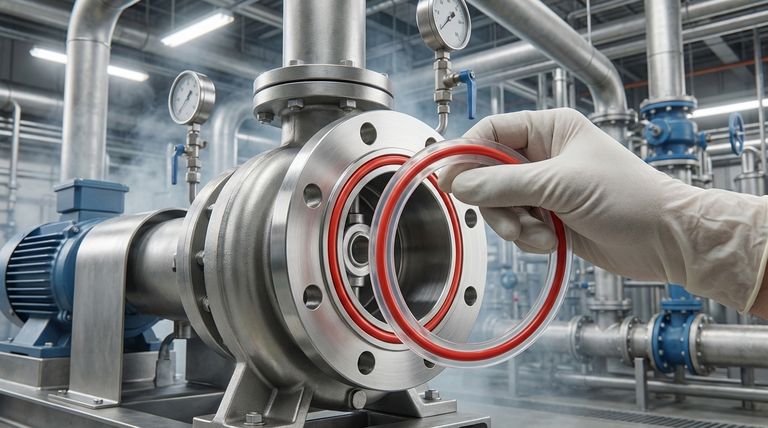In the most demanding industrial environments, Teflon-encapsulated O-rings serve a critical role as a high-performance sealing solution. Within the oil and gas and chemical processing industries, they are essential for maintaining the integrity of pumps, valves, and compressors by preventing leaks and contamination where aggressive chemicals and extreme temperatures would cause standard seals to fail.
The core value of a Teflon-encapsulated O-ring is its hybrid design. It combines the near-universal chemical inertness of a Teflon jacket with the reliable sealing pressure of a flexible elastomer core, solving a problem that neither material could handle alone in harsh applications.

Why a Standard O-Ring Fails
The Limits of Elastomers
Standard elastomer (rubber) O-rings are highly effective in many situations. However, when exposed to the aggressive solvents, acids, and bases common in chemical processing, they can swell, degrade, and lose their sealing capability.
The Problem with Solid Teflon
While a solid PTFE (Teflon) ring offers exceptional chemical resistance, it lacks the elasticity and "memory" of an elastomer. It is too rigid to conform to surface imperfections and cannot maintain a consistent sealing force under fluctuating pressures and temperatures.
The Engineering Behind Encapsulation
The Protective Teflon Jacket
The outer layer of the O-ring is a seamless jacket made of Teflon FEP or PFA resin. This jacket acts as the primary barrier, providing elite protection against nearly all industrial chemicals and a wide temperature range.
The Resilient Elastomer Core
Inside this jacket is an elastomer core, typically made of Silicone or FKM (Viton). The core's sole purpose is to provide the "springiness" or flexibility needed to energize the seal, ensuring it exerts constant pressure against the hardware.
A Unified Sealing Solution
This two-part construction creates a single component with the best attributes of both materials. The elastomer core provides the reliable sealing force, while the Teflon jacket protects it from chemical attack, dramatically extending the component's lifespan and reliability.
Key Applications in Hostile Environments
Sealing Pumps and Valves
In equipment moving corrosive or high-purity fluids, these O-rings are used to seal flanges, shafts, and valve stems. This prevents dangerous leaks, protects personnel, and avoids contamination of the process media.
Ensuring Compressor Integrity
Compressors often operate under high pressures and significant temperature swings. Teflon-encapsulated O-rings provide a durable seal that can withstand these conditions without degrading, ensuring both safety and operational efficiency.
Protecting Downhole Tooling
In oil and gas exploration, downhole tools and electronics are exposed to extreme pressures, temperatures, and corrosive subterranean fluids. These seals are used to protect critical internal components from this harsh environment.
Understanding the Trade-offs
Higher Compression Set
The Teflon jacket is inherently less elastic than a pure elastomer. Over time, particularly at high temperatures, the seal can take a permanent "set," which may reduce its ability to seal effectively in applications with frequent thermal cycling.
Installation Sensitivity
The Teflon jacket can be nicked, scratched, or creased during installation if proper care is not taken. Any damage to this outer layer creates a leak path that compromises the entire seal.
Cost Considerations
These are specialized, high-performance components. Their initial cost is higher than that of standard elastomer O-rings, a trade-off that is justified by significantly longer service life, reduced downtime, and enhanced safety.
Making the Right Choice for Your Application
Selecting the right seal requires a clear understanding of your operational priorities.
- If your primary focus is maximizing chemical compatibility: Teflon-encapsulated O-rings are the definitive choice for sealing against a wide or unknown range of aggressive process fluids.
- If your primary focus is managing extreme temperatures: Ensure you select the correct core material (Silicone for broader ranges, FKM for high heat) to complement the Teflon jacket's capabilities.
- If your primary focus is mechanical performance with high pressure: Consider using Teflon backup rings in conjunction with the encapsulated O-ring to prevent it from extruding out of the seal groove.
This hybrid design provides the engineering confidence required to maintain operational integrity in the world's most challenging process environments.
Summary Table:
| Key Feature | Benefit | Ideal For |
|---|---|---|
| Teflon (FEP/PFA) Jacket | Superior chemical inertness and broad temperature resistance | Sealing against aggressive acids, solvents, and bases |
| Elastomer Core (Silicone/FKM) | Provides flexible sealing force and energizes the seal | Maintaining seal integrity under pressure and temperature fluctuations |
| Hybrid Design | Combines chemical resistance with reliable sealing performance | Pumps, valves, compressors, and downhole tools in hostile environments |
Need a reliable seal for your most demanding application?
At KINTEK, we specialize in manufacturing high-performance PTFE components, including custom Teflon-encapsulated O-rings. Our precision production ensures the exact chemical resistance and mechanical properties your operation requires, from prototypes to high-volume orders for the semiconductor, medical, laboratory, and industrial sectors.
Let us engineer a sealing solution that protects your equipment and enhances safety. Contact our experts today to discuss your specific needs.
Visual Guide

Related Products
- Custom PTFE Parts Manufacturer for Teflon Parts and PTFE Tweezers
- Custom PTFE Parts Manufacturer for Teflon Containers and Components
- Custom PTFE Measuring Cylinders for Advanced Scientific and Industrial Applications
- Customizable PTFE Seals Filter Holders for Versatile Applications
- Custom PTFE Square Trays for Industrial and Laboratory Use
People Also Ask
- Why is PTFE rod suitable for automotive applications? Boost Vehicle Performance & Durability
- What industries use PTFE machined parts and for what applications? Critical Components for Demanding Environments
- What are the key advantages of PTFE? Unmatched Performance for Extreme Environments
- What are the future considerations for machining Teflon? Mastering Material Challenges with Smart Tech
- How does PTFE contribute to low friction and wear resistance? Achieve Superior Performance with Advanced Materials



















